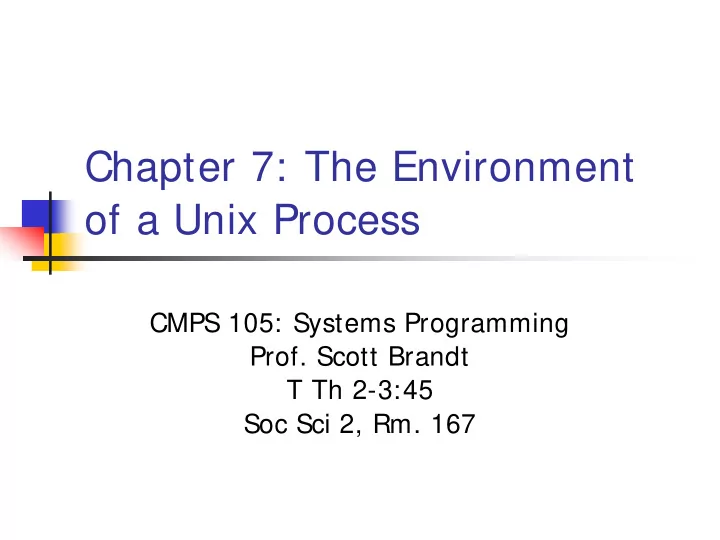

Chapter 7: The Environment of a Unix Process CMPS 105: Systems Programming Prof. Scott Brandt T Th 2-3:45 Soc Sci 2, Rm. 167
The main() function � int main(int argc , char * argv []); � argc = number of command-line arguments � argv = array of pointers to the (string) arguments � main() is the first thing called in the program � A special start-up routine is called first (specified in the executable) � That’s what sets up the parameters to main
Process Termination � Five ways to terminate a process � Normal termination � return from main() � call exit() � call _exit() � Abnormal termination � call abort() � terminate by a signal
exit() and _exit() � # include < stdlib.h> (ANSI C) � void exit(int status ); � Performs a clean shutdown of the standard I/O library � # include < unistd.h> (POSIX) � void _exit(int status ); � Exit status undefined if not specified
atexit() � ANSI C: A process can register up to 32 handler functions to execute when the program exits � Typically used to clean up � # include < stdlib.h> � int atexit(void (* func )(void)); � func is a pointer to a function that takes no parameters � Specified by using the name of the function (without parantheses)
Exit handling � Draw and discuss Figure 7.1 on page 164
Command-line arguments � Programs can pass command-line parameters # include < ourhdr.h> int main(int argc, char * argv[]) { int i; for(i= 0; i < argc; i+ + ) print(“argv[% d]: % s\n”, i, argv[i]); exit(0); }
Environment List � Each program is passed an environment list � extern char * * environ; � Each environment string consists of name= value � Most names are uppercase � Usually ignored, but can be useful � Why?
Memory Layout of a C Program Text segment � The machine instructions of the program � Usually sharable and read-only � Data segment (initialized data) � Global variables that are initialized in the program � BSS (uninitialized data) � Global variables that are not initialized in the program � Initialized to zero or null pointers � Stack (automatic variables) � Function return information � Local variables � Heap � Dynamic memory allocation � See figure 7.3 on page 168 �
Shared Libraries � Single shared copy of common library routines � Instead of each one being copied in each program � Big space savings � 24576 vs. 104859 for hello world � For details, see comparison on page 169
Memory Allocation # include < stdlib.h> � void * malloc(size_t size ); � Allocates the specified number of bytes � Uninitialized � void * calloc(size_t nobj , size_t size ); � Allocates space for the specified number of objects � Initialized to all 0s � void * realloc(void * ptr , size_t newsize ); � Changes the size of a previously allocated area � May move to a new location (and copy old contents) � New area is uninitialized � void * free(void * ptr ); � Frees allocated space �
Common mistakes Writing past the end of an allocated region or variable � Overwrites record-keeping information or other data � Really, really hard to find � Failing to free memory � Memory leaks � Big problem when not using virtual memory � Freeing memory more than once � May cause memory to be allocated twice! � Calling free() with a bad pointer � Free tries to free up whatever is pointed to by the pointer � Can be caught with special memory management functions � Not automatically checked because of overhead involved �
alloca � Allocates memory from the stack � Doesn’t have to be freed � Doesn’t live past the return from the calling function
Environment variables � Used by applications only (not the kernel) � name= value � Common: HOME, USER, PRINTER, etc. � # include < stdlib.h> � char * getenv(const char * name ); � Returns null if not found
Other Environment functions � int putenv(const char * str ); � Creates (or overwrites) environment variable � int setenv(const char * name, const char * value, int rewrite); � Same as putenv (modulo params), except � Does nothing if rewrite = 0 and old value exists � int unsetenv(const char * name); � Clears an environment variable
setjmp() and longjmp() � Allow gotos from lower in a call stack to higher in a call stack � setjmp sets up the location to jump to � longjmp jumps there � Parameter contains the environment of the function that will be jumped to � Bottom line: don’t use these!
getrlimit and setrlimit � Query and change resource limits � # include < sys/time.h> � # include < sys/resource.h> � int getrlimit(int resource , struct rlimit * rlptr ); � int setrlimit(int resource , const struct rlimit * rlptr ); struct rlimit { rlim_t rlim_cur; /* soft limit: current limit * / rlim_t rlim_max; /* hard limit: max value * / }
Resources RLIM_INFINITY = unbounded � RLIMIT_CORE: max core file size (0 = none) � RLIMIT_CPU: max CPU time in seconds � RLIMIT_DATA: max size of data segment � RLIMIT_FSIZE: max size in bytes of a file that may be created � RLIMIT_MEMLOCK: locked-in memory space � RLIMIT_NOFILE: max # open files � RLIMIT_NPROC: max # of child processes per real user ID � RLIMIT_OFILE: same as RLIMIT_NOFILE � RLIMIT_RSS: max resident set size in bytes (max memory footprint) � RLIMIT_STACK: max stack size � RLIMIT_VMEM: max size of mapped address space (affects mmap) �
Recommend
More recommend